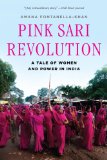Summary | Excerpt | Reviews | Beyond the Book | Readalikes | Genres & Themes | Author Bio

Critics' Opinion:
Readers' Opinion:
First Published:
Aug 2013, 304 pages
Paperback:
Aug 2014, 304 pages
 Book Reviewed by:
Book Reviewed by:
Kim Kovacs
Buy This Book
Babuji and Lakhan had followed Sampat and the women from a distance, but when they arrived at the destination, they hung back—neither daring to get too close to the police compound. "She told all the male supporters to stay behind the group of women," Lakhan recalls, referring to Sampat. This order was for their own protection. "Sampat didn't want people to raise fingers at the men and say, 'You've started all this.' You see, Sampat thought the police would cook up charges against us." She deemed women less vulnerable to police attacks. "There is no women's jail nearby so it is hard to arrest them," Lakhan explains. The police also "don't do laathi charges on women," he adds, referring to the police practice of dispersing protesters by charging at them with the large bamboo sticks. A large crowd of people gathered, blocking Bisanda Road. People living opposite the station leaned out of their windows or went up onto their flat roofs to get a better look.
The women entered the compound and then gathered in front of the veranda of the police station, under a red-and-blue plaque that read, "ATARRA POLICE STATION—1960." "Okay, everyone," Sampat shouted to her troops, "Don't be afraid!"
Sampat walked across the veranda and into the narrow, crowded office of one of the policemen. She was followed by at least one cameraman and as many women who could fit into the room—the others hovered outside the door. "All of you, sit outside," the policeman commanded, but Sampat overruled him.
"No! We will sit here!" she yelled. Turning back to the women, she instructed them, "Sit down, sit down," tugging at Sushila and the other women, who were unsure what to do.
After the women had squatted in the cramped office, taking over all the floor space, Sampat turned to the young officer and, pointing an accusing finger at him, shouted, "You've kept a poor woman's husband out here all night. I'll take him with me today. What form of justice are the police giving?" The policeman did not answer; he picked up his crackling walkie-talkie and transmitted code messages to his colleagues—"Delta One, enter mobile from Delta One"— and then sat tight.
Sampat, realizing that this junior officer was not the right person to deal with, stomped out of his office and went to speak to the subinspector, a balding, beer-bellied man with a moustache called Sangham Lal Singh. The subinspector was sitting behind a desk overlooking the veranda.
"By shouting in this manner you're not going to achieve anything," lectured the police officer from his chair, waving his index finger at Sampat.
"No? Then we'll shout more!" Sampat retorted. "Raise your voices, we're all one! Strength in unity!" she hollered toward the women, her chorus of chanters, who had gotten up and followed her outside. All of the women raised their fists and joined in Sampat's rallying cries.
With several cameras pointed at him, the officer, looking embarrassed, tried to get Sampat to turn back to him and stop this raucous, impassioned chanting, which was disrupting the calm of his station.
"Come this side, don't cause any drama," said the exasperated officer, motioning Sampat toward him.
"Without her consent, how did you dare just take her husband? So you've got bullets, have you? I don't care. I don't fear the police. You're a human, just like me," she shouted, banging her fist on the desk behind which the officer sat. Just then, Sampat thought she heard the policeman mumble haram zadi, which means "bastard."
Sampat's eyes grew wild. "You call me a haram zadi? Have you gone mad?" she shouted hoarsely, her voice breaking. Whipping her head around to face the women behind her, she repeated in a hysterical tone, "He called me a haram zadi!" her outrage growing.
Excerpted from Pink Sari Revolution: A Tale of Women and Power in India by Amana Fontanella-Khan. Copyright © 2013 by Amana Fontanella-Khan. With permission of the publisher, W.W. Norton & Company.





The Funeral Cryer by Wenyan Lu
Debut novelist Wenyan Lu brings us this witty yet profound story about one woman's midlife reawakening in contemporary rural China.
Your guide toexceptional books
BookBrowse seeks out and recommends the best in contemporary fiction and nonfiction—books that not only engage and entertain but also deepen our understanding of ourselves and the world around us.